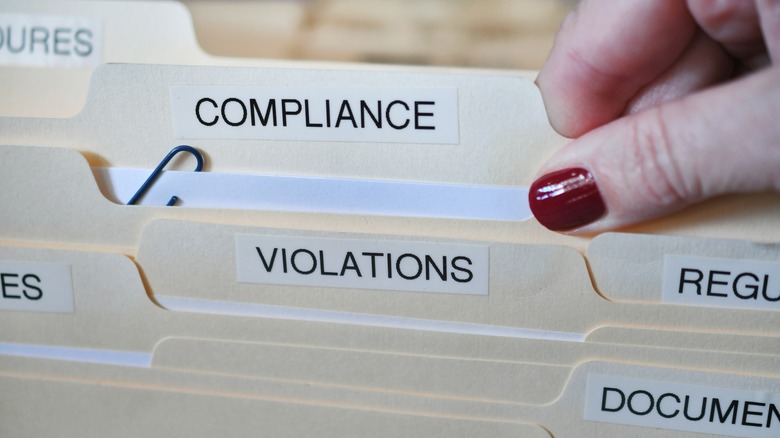How To Effectively File A Complaint To Make Sure HOA, Co-Op Board, Or Landlord Listens
Making a complaint to your HOA, co-op board, or landlord can be frustrating because you can't ever be sure they will actually listen to you. Sometimes, the complaint process can be worse than the problem itself. We've all dealt with the nightmare of noisy neighbors, the random rent increases that mess with our budgets, or the deadly black mold hiding in the bathroom. These problems can turn our homes into frustrating and miserable battlegrounds. But the real challenge is not just admitting the problems, it's getting someone to actually do something about them. Whether you rent or own, we all struggle to get the attention we need from the governing bodies.
The good news is that you can do a few things when filing a complaint to give you the upper hand. Some are more obvious, like being polite instead of aggressive when asking for help, but others are a bit more obscure, like using governing documents and social media to your advantage. If you are struggling to be heard, try these tips to finally get the closure you deserve.
Review the governing documents before you act
One of the first ways to ensure the entity you're complaining to listens is to know what you are up against. To do this, you should familiarize yourself with your HOA or co-op bylaws, rental agreement, or lease terms to understand your rights and the proper complaint procedures. Whether you're a homeowner, tenant, or co-op shareholder, these documents explain all the dos and don'ts for everyone in the community. They cover things like property maintenance, noise levels, pet policies, and more. Knowing the rules can help you avoid any accidental slip-ups and the resulting fines. They can also let you know if your complaint has a leg to stand on.
Becoming familiar with the governing documents also means you'll be better prepared when it's time to make a complaint. There are usually specific procedures in place for how to handle things. By understanding the process, you can save yourself time and make sure your issue gets in front of the right person, leading to faster resolutions and fewer misunderstandings. Plus, when you know the rules, you can back up your complaint with solid evidence from the documents. When you've read them, it will be easier to make your point and get what you want.
Document the issue with pictures and videos
When dealing with problems in your community, it's important to document everything. It is harder for your landlord or HOA to ignore you if you have solid evidence. So, take pictures and videos to show exactly what went wrong. Whether it's a leaky roof, a broken appliance, or a noisy neighbor, document everything. This evidence makes it easier for your landlord or the building management to understand what is going on and figure out how to fix it. This is also helpful if the governing body tries to tell you the problem isn't a big deal or didn't even happen.
For example, if you say the fire alarm keeps going off at 3 AM, yet they have "no records" of this happening, a timestamped video of it blaring on your phone will immediately prove you are telling the truth. So, the more evidence you have, the better. It leaves less room for misunderstandings and makes it less likely for there to be arguments about what occurred. And if things get really bad and you need to take legal action, having all your evidence ready can reduce the amount of work you have to do to prepare a case down the road. Just know that in some states, you must inform someone that you are recording them.
Stay calm and respectful at all times
As emotional as trying to get a problem in your home fixed can be, it's important to stay calm and respectful at all times during the process. Unfortunately, becoming visibly upset and doing things like yelling and cursing can damage your credibility. Whether you're talking to your landlord, HOA board, property manager, or even just your neighbor, being collected can prevent conflicts from blowing up out of control. You can set a positive tone that makes the other person more likely to listen to your concerns. It also allows both parties to focus on the conflict in front of them rather than getting derailed by focusing on perceived slights or bad tones.
Positive social behavior and language show that you're responsible and reasonable. If you find yourself getting upset, step away for a moment or say you will call them back. It's important to do this, as staying calm and respectful can protect your rights and reputation. If there's a dispute or you need to take legal action, your behavior throughout the process is really important. A kind approach shows that you want to resolve things peacefully, which a judge will tend to favor.
Follow the formal process for complaints
Using the official complaint channels outlined in your governing documents is important when dealing with issues with your landlord or HOA. It shows that you know the rules and can follow them. By going through these formal procedures, you increase your chances of being taken seriously. First, most HOAs feel that following the established procedures prevents any favoritism or unfair decisions. This is especially important when there are disputes with other residents. Plus, those in charge think the formal process helps resolve issues quickly and efficiently. They have designed these channels to direct complaints to the right people and provide a structured way to solve problems. This means your concerns will get attention right away.
Unfortunately, anyone who has ever actually filed a complaint with a landlord or brought something up with the HOA might roll their eyes at this. In real life, doing things officially often means a lot of bureaucracy and waiting around. However, if you don't follow the formal process and try to jump the queue or take care of things yourself, those in power are likely to knock you back. They will ask if you've spoken to this person or filed that form. It is better to do things by the book, at least at first, so you are taken seriously — or you at least establish the paper trail that says you are doing things "right."
Put it all in writing
Always write your complaints down. This creates a paper trail that can help get things sorted out. Writing down your concerns via email gives you (and anyone else who sees your complaint) a clear record of what is happening. This can be important if things get worse or if you have to take legal action, as you need proof to back up each allegation.
Another benefit of putting complaints and requests in writing is that it's more official. Landlords, property managers, and HOAs tend to take written complaints more seriously. Once something is written down, it is harder to dispute it later. This is especially true if you have a verbal conversation with someone. Perhaps you pass your landlord in the hallway or stop by your HOA's office to talk about a problem you are having. People can remember details of conversations very differently as time goes on. To avoid misunderstanding, follow up any spoken conversation with a written summary, sent by text, email, or even snail mail if necessary. This ensures everyone understands your concerns and avoids any misunderstandings. It also provides time stamps for what happened and when.
Be as specific as possible
When you file a complaint, it's really important to be super specific. If you clearly explain exactly what the problem is — including dates, times, and where it happened — those in power might be more likely to listen. This is because when you give all the details, there's no room for confusion or misunderstandings. This can be especially helpful if your complaint involves your tenant's rights being violated or a health issue like mold.
For example, saying your landlord entered your apartment without notice at 1:14 pm on Tuesday the 10th of May while you were getting out of the shower, causing you distress, holds a lot more weight than "they just randomly stop by sometimes." In most states, landlords must schedule inspections in advance and cannot just "stop in." But by painting a picture with details, it's harder to dispute what happened. You could say the same for something like reporting a suspicious vehicle. Reporting the car's color, make, model, and license plate will get you a lot farther than just mentioning "the car that's always parked there."
Suggest solutions to your complaint
When you submit a complaint, it's a good idea to suggest possible solutions to the problem, too. This shows that you're being proactive and can help speed up the process of resolving the issue. For example, if you're dealing with a recurring maintenance issue, you could propose a timeline for repairs or even suggest a specific contractor who can swing by to fix it. By doing this, you're taking some of the decision-making off the governing body's shoulders, which usually gets things moving faster.
If you're having a dispute with a neighbor, you can also suggest mediation to solve the problem. You can offer to talk it out with your neighbor or attend a community meeting together to find a solution that works for both of you. This collaboration can help build a sense of community and make problem-solving easier. If money is needed to fix the problem, you could propose sharing the costs or coming up with a fair way to split the expenses between everyone affected. By showing that you're willing to chip in financially, you're demonstrating your commitment to being part of the solution. Please note that this typically only applies to homeowners, as renters should not be financially responsible for most maintenance issues.
Communicate directly with the problem when possible
Whether it's annoying neighbors, the people who take care of the landscaping for your neighborhood, or anyone else causing trouble, you can sometimes solve the problem before filing a complaint through an easy conversation. If you do this before talking to the governing body, you can make sure they listen to you because your answer to, "Well, have you talked to them about it?" will be an easy "yes."
By expressing your feelings and the issue directly to the person or group that caused it, they may understand and change their behavior, especially if they were unaware or didn't mean to cause a problem. Plus, talking it out can bring the neighborhood or building closer and facilitate working together. Having a friendly chat may improve your relationship with noisy neighbors, and discussing concerns with landscaping workers could result in compromises, like adjusting their schedule. If talking doesn't solve the problem, you can then escalate things by going to your HOA, co-op board, or landlord for help.
Address the right person
When it is time to escalate the problem, you need to know exactly who to complain to. That's because when you reach out to the right person, you're more likely to get the answer you want, or at least an answer at all. This is preferable over waiting weeks to hear back, only to be bounced around from person to person because no one actually deals with the problem you are having.
For example, your co-op board might have a secretary who files all the paperwork and schedules meetings. Speaking to them first instead of leap-frogging over them and going straight to the chairman can solve things without ruffling any feathers. The chairman would likely ignore your email since they're busy with more high-level tasks, which can waste days, if not weeks, until you realize they deleted your message and you should try someone else. You could say the same for apartment maintenance issues. Speaking to the leasing office won't get your air conditioning unit fixed. Instead, you need to contact the landlord or building manager to get the wheels turning.
Include neighbors' support for your case
If other residents share your concerns, speak to them and encourage them to submit similar complaints to show collective dissatisfaction. When several people report the same problem, it shows that it's not just one person exaggerating but a genuine issue that affects everyone. This can apply more pressure, making those in power listen. Community action is especially useful for problems related to maintenance (the lock on the front door being broken, leaving all apartments vulnerable), collective health (there is black mold in the basement), or nuisance (the people at number six have loud parties that last until 3 am every single night).
Collective complaints work like a petition, showing a united community willing to work together to better its environment. Doing things this way can even come in handy in more serious situations, like taking things to court or mediation. Multiple complaints from different residents strengthen the case.
Attend meetings to make your voice heard
Joining meetings in your HOA or co-op is a proactive way to have your voice heard. Going to these meetings gives you a chance to talk openly and directly with the people in charge. It also helps if you are involved before making a complaint, as the decision-makers already know who you are and can then put a face to the name. Plus, attending these meetings can be much more impactful than sending emails or letters. This is because you can discuss concerns verbally, get clarification right away, and receive immediate feedback on how to go forward. There are also always meeting notes taken to document what was discussed.
When you attend a meeting, you become a part of the decision-making process. You typically get two to three minutes to voice your complaint, so make sure you have your speech ready and are clear and to the point. If you feel like you need to elaborate more, you can send a letter after the meeting with more details. However, remember that it is important to approach these meetings with respect and professionalism. If you want those in charge to listen to you, you have to focus on constructive conversation instead of confrontational tactics.
Review your legal options
Sometimes, it might be time to get litigious. Having a chat with a lawyer can help you understand your rights and the possible solutions available to you. This legal knowledge comes in handy when nice, peaceful solutions just aren't working. If you feel unsure about speaking to a lawyer or can't afford one, there are still other options. A third-party mediator, like an ombudsman or tribunal, is also a good resource. These people are trained to help everyone work through their issues and come to a solution that everyone can agree on. They usually know all the housing laws and have likely dealt with the problem you are facing before.
Remember: Taking legal action isn't just about fixing things — it's also about making sure your rights as a resident or homeowner are protected. Sometimes, you need to go to court to make sure people do what they're supposed to do, pay for any damages they've caused, or face the consequences if they've broken any laws or contracts. It's kind of a last resort, but it's a surefire way to make people listen.
Utilize social media
Using social media and local online forums like NextDoor, Facebook, and even Quora can be helpful when gathering evidence or seeking support for your complaint. These platforms let you talk about your concerns to a bigger group of people. By sharing your experiences and issues, you can make others aware of problems that might affect lots of people but aren't obvious to everyone. Learning from people who have gone through similar problems can also give you useful knowledge to make better decisions when dealing with your concerns.
Forming alliances is another advantage of using these networks. When a group of residents in the community works together, it's more likely that the people in charge will take their concerns seriously. Plus, you can put the pressure on for change. By talking about your concerns online and asking for support, you might push the people in charge or the property managers to take action so they don't look bad. Finally, it's important to document the problem. Putting your concerns on these platforms creates a digital record of what's happening. This can be really helpful evidence if you need to make a formal complaint later on.
Involve the local authorities
If an issue poses health or safety risks or violates housing laws, you can involve the police or local city council. For example, if you know the house next to you is participating in something wildly illegal, you don't need to make a complaint to the HOA; just call the police. The same could be said for a landlord breaking fair housing laws like discriminating based on race or gender, or showing up unannounced. These things can be reported to the Department of Housing and Urban Development and local tenants right's groups.
It's also good to involve the local authorities in extreme situations like this because it creates an official record of the issue. Having a police report or lodgement receipt can be important for things like insurance claims or if you need to take legal action later on. It shows that you tried to deal with the problem in the right way, following all the proper procedures. Lastly, if you've managed to come to a resolution, but the other party isn't following through on it, the local authorities can help. They can make sure that the resolution is enforced and that your rights as a resident are protected.














